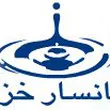With the aim of exploration and exploitation of iodine in the eastern coasts of the Caspian Sea’s under ground brine reservoirs, an extensive geological survey of the area was carried out and the studies and exploratory wells proved the abundance of brine underground lakes with high iodine content which resulted in the formation and establishment of Kansar Khazar Co. in 2003 The know how and engineering was fully elaborated by the newly established company’s technical team and the equipment were mostly built by local manufacturers. The production started in 2008 and reached a quantity of 17300 Kg which gradually increased to 301000 Kg in 2015-16 and is expected to .reach 400000 Kg in 2017 Kansar’s iodine is a USP / BP Standard product with a minimum content of 99.8% and has been supplied to the local market ever since its start of production. Iran’s pharmaceutical industries top the list of company’s iodine consumers followed by producers of bactericides and disinfectants, salt additives, animal feed supplements, and more. It also has wide use in petrochemical industries as catalyst, paints, and in various diagnostic contrast media For the first time out of the total 42 MT production of 2011, 15 MT was exported. Strict observation of quality and packing standards and careful coordination for the safe and fast arrival of the goods at destination have led to an increasing demand by many pharmaceutical industries in China, India, Italy, Russia, Japan, Germany and more countries to the extent that out of 301 MT production of 2015, 215 MT were exported and the export figure in 2016 has exceeded that of last year’s figure. Iodine content of the reservoir under exploitation is estimated to exceed 16000 MT Kansar has created 150 direct and permanent and hundreds of indirect jobs in the region. This figure as well as the output will almost be doubled with the start of Kansar Khazar's expansion project which is awaiting the final government’s approvals. However a good part of the job including geological and engineering studies have been completed, roads have been built, equipment manufacturing contracts have been prepared, and about 30% of the overall estimated project costs have been already spent. With the start of production of the expansion project and the consequent production increase, Kansar will be able to play a more determining roll in the iodine market of the South Indian Ocean countries and an effective roll in improving the living conditions of many who live in the region







